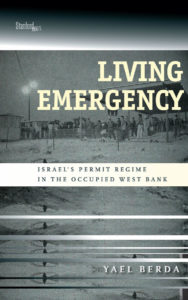Living Emergency: Israel’s permit regime in the occupied West Bank

Reviewed by Ariel Handel , Society & Space, (Stanford University Press, 2017, 152 pages, $12.99)
“The checkpoints in the West Bank, particularly during the second Intifada (2000-2007), have been well-known for their arbitrariness and for the atmosphere of uncertainty they have constantly produced among the Palestinian population. Thus, for example, when Tobias Kelly asked his Palestinian interlocutors about the reason for a particular checkpoint, “they would just laugh at me, telling me that it was biddun sabab (without reason) and that I should stop trying to find an explanation beyond the whims of the soldiers” (Kelly, 2006: 102). The military checkpoints’ system has been built patch over patch, and the territory was divided between many commandments in different levels, with no central control or guiding hand. The question why a particular checkpoint was built and why did the soldiers let someone through or alternatively detained them for half a day, could indeed be seen as a waste of time.”
“In Living Emergency, Yael Berda’s mission is, nevertheless, to decipher the reason. Not the reason for a single act or a specific checkpoint, but rather the raison d’etre of the entire permit regime in the Occupied West Bank.”
“Berda, an Assistant Professor of Anthropology and Sociology at Hebrew University, based the book on her experience as a human rights lawyer representing more than two hundred Palestinian clients in their attempt to obtain movement permits, or to struggle against their arbitrary cancellation. As a Jewish-Israeli attorney, Berda’s position gave her access to documents, institutional knowledge, and personal encounters with key figures in the permit regime. The book is thus a combination of first-hand stories, detailed documentation, dozens of interviews, and analysis.”
“Berda argues that the permit regime in the West Bank is a sophisticated apparatus aimed at the racial management of movement in a settler colonial context. As such, the permit regime serves as a means of controlling and monitoring the Palestinian population through security classifications. The book’s relevance is not limited to Israel/Palestine, however, since “the management of Palestinian population in Israel has served as a laboratory for policies and technologies restricting mobility, particularly to police social inequalities” (9). Deciphering the Israeli system of control in the West Bank is thus important for understanding contemporary technologies of control, varying from urban policing to “the global war on terror.” (more…)
